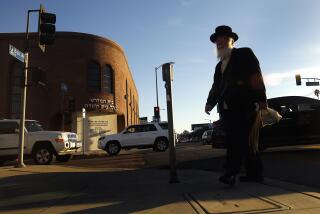A SLICE OF ISRAELI CHASSIDIC FESTIVAL
- Share via
The words may be weighty and biblical, but the music is decidely upbeat.
For the last 18 years, composers around the world have been vying for top honors at the Israeli Chassidic Festival, a competition held in Jerusalem to determine the best settings of biblical texts to new music.
For those unable to be there in person, a small traveling troupe has been exporting a scaled-down version of the contest to the rest of the world.
The troupe’s eight singers and four musicians will perform the top 10 entries in Orange County tonight as part of a seven-week tour of 57 cities in the United States, Canada and Europe.
The exported version--the 7:30 p.m. performance will be held at the Don Wash Auditorium in Garden Grove--also will include Yiddish and older Israeli melodies, folk dances, a recreation of a Jewish wedding and medleys drawn from musicals such as “Fiddler on the Roof.”
“The festival is a major event in Israel,” said Rabbi Leonard Rosenthal, 34, director of the Jewish Studies Institute Day School in Anaheim, which is sponsoring the festival in Orange County for the fourth year.
“In Israel, it’s done with full orchestra and is televised throughout the country.”
The songs are written in a variety of popular musical idioms--from traditional Eastern European folk music to rock and “even a little bluegrass,” Rosenthal said.
Despite the event’s popularity in Israel, there are some dissenting voices.
“The songs and dances are offensive to some extremely Orthodox Jews,” Rosenthal said, citing the sacredness of the words and the fact that “men and women dance together.”
Rosenthal, a rabbi at Temple Sharon in Costa Mesa, said he himself has felt uncomfortable with some rock settings of religious texts.
But overall, he is positive because the event “draws singers from all three traditions of Judaism--the (Eastern European) Ashkenazic, the (Occidental) Sephardic and the Arabic.”
“And the festival helps connect the American Jewish community with, on the one hand, their roots in Jewish biblical literacy and the synagogue, and, on the other, with the modern state of Israel,” he said.
Most of the songs are sung in Hebrew, but occasionally Yiddish or even English is heard. (The traveling troupe will translate the songs before they are performed.)
Rosenthal said the festival consists of performances of 10 final entries selected by a committee of composers, arrangers and musical figures in Israeli TV and broadcasting. But a live audience picks the three top winners.
“They actually use an applause meter,” Rosenthal said.
More to Read
The biggest entertainment stories
Get our big stories about Hollywood, film, television, music, arts, culture and more right in your inbox as soon as they publish.
You may occasionally receive promotional content from the Los Angeles Times.










